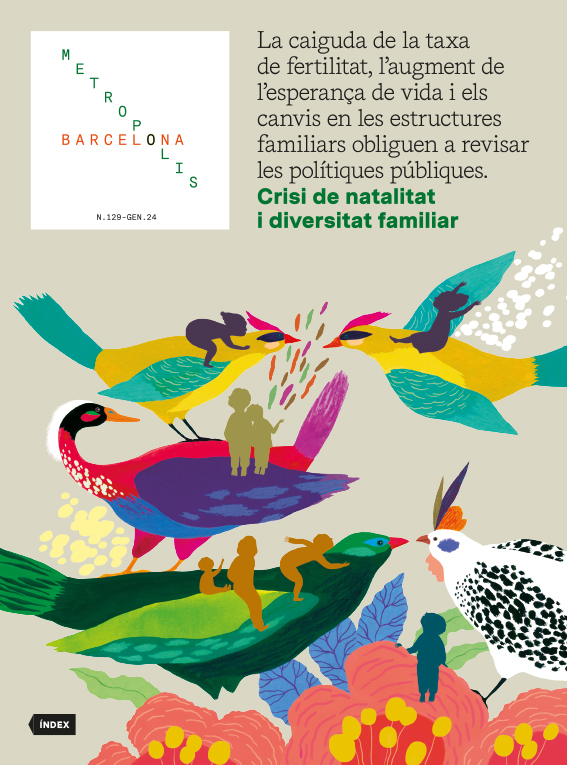The emotional roots of the birth rate crisis
Birth rate crisis and family diversity
- Dossier
- Jan 24
- 6 mins
The current birth rate crisis is linked to something deeper than cultural or sociological aspects. It is connected to a shift in consciousness and a spiritual revolution, where our authenticity is inseparable from the need to learn from emotional experiences. The mind-body disconnect in today’s society presents a challenge for grasping the genuine needs of human beings, including the desire to have children.
We are on the brink of a profound structural shift, where existing family configurations give rise to emerging group and individual needs. Conversely, these needs, in turn, feed into the evolving concept of family. In the aftermath of the pandemic, healthcare professionals have witnessed, we could say, a hopeful surge of new manifestations of emotional distress: young adults are reappraising their identities, plunging many into crisis; numerous teenagers are delving into their deeper needs and the accompanying pain; some children are forging deeper, more authentic and more enduring connections with their caregivers, while others bear witness to parental relationship crises, with all the ensuing emotional implications it entails. The world came to a standstill; human minds had to hit pause, prompting a reassessment of many automated operational systems.
The concept of family extends beyond the traditional concept, tied to the notions of group belonging and intimate connection. This encompasses not only the nuclear family but also includes childless couples, single-parent families, and more. We are amidst a paradigm shift, challenging the notion that family must inherently involve the presence of children. And, for many reasons, within this shift, there’s a profound reassessment of well-being, redefining the essence of satisfaction and happiness. This entails an element of personal fulfilment that contributes to overall fulfilment within the family.
Patients in crisis, enduring unnamed anguish
In consulting rooms, we come across numerous patients grappling with crises, contemplating profound reappraisals of what they need in life to find inner peace. The repetition of past patterns is no longer as prominent, or at least, if observed, it follows a process of heightened awareness regarding their desires – based on honest and heartfelt considerations, viewed from a life perspective. They strive to strike a balance between generosity and the impulse to give – such as through having children – and the need for self-care.
The birth rate crisis can be understood from various perspectives, encompassing the factors I discussed earlier as well as other causes intertwined with sociodemographic, economic, political and cultural elements. These factors involve lifestyles that are hardly compatible with child-rearing. Additional concerns, tied to a lack of connection with one’s own desires, indicate a detachment from one’s humanity, an inclination toward practicality, and shallower connections, all contributing to the absence of family structures. This situation reflects the conundrum between personal growth and the “psychopathic” individualism prevalent in our contemporary Western society.
From a psychosomatic standpoint, we are witnessing a growing incidence of fertility issues, a phenomenon intricately linked to the aforementioned factors, serving both as a cause and an effect of the transformations in the bio-psycho-social domain that have unfolded over the past decades.
In my clinical practice, I have witnessed shifts in the manifestation of distress to the point where the reasons for seeking the consultation are becoming more nuanced and can be categorised as generalised anxiety. This is frequently accompanied by elements of confusion and a sense of unease without a clear understanding of the underlying emotions. Anxiety, as such, isn’t merely an emotion but a psychophysical expression of anguish. There is an increasing recognition of the need to delve into and aid in comprehending the intricate roots of this unnamed suffering.
In therapeutic processes, we come across a wide range of scenarios. In cases where parents bring their children to therapy, we identify signs of familial distress – whether through enuresis, encopresis, hyperactivity, generalised anger, and so on. Implicitly, we observe deeply unwanted children at a profound level. Some teenagers, initially desired offspring, express the displeasure of living with parents constantly at odds with one another. To navigate this, they have had to develop a high degree of self-sufficiency to bear the weight of a conflict not of their own making. On other occasions, we work with adults grappling with uncertainties about whether to have children. Here, the importance lies not solely in the decision itself but in the need for the decision to be rooted in mindfulness rather than in egocentric, immature and childish desires.
In our consulting rooms, we see considerable psychic distress arising from challenges in personal maturation. Navigating this requires time, patience and a belief in one’s capacity to acquire self-management skills. Learning emerges from emotional experiences, constituting a process intricately tied to the subjectivity that defines us as human beings.
The need to integrate body and mind
It is of paramount importance that we focus on tackling the root causes of the distress affecting our culture. The system needs support to foster a healthy individuation process, which can be further strengthened through a parenting programme. Furthermore, we must consistently broaden the spectrum of resources for handling emotional distress, moving beyond a sole reliance on psychopharmacology for regulating health.
Family relationships cannot be based on the clan mode or on symbiosis between members, nor on the sum of individuals operating in an individualistic manner.
Balanced families with children need to educate themselves about the dynamics among emotionally healthy individuals. This involves nurturing relationships free from a clan-like mindset, avoiding symbiosis among members, and steering clear of a mere sum of individuals operating independently with minimal communication. How did we arrive at this point in a society marked by a dissociation between mind and body? The pathway to growth lies in giving integrated attention to both aspects.
When I started my training and specialisation in patient care, the reasons for consultation were psychosomatic, given the clinical-hospital setting. It provided a means for users to express their malaise.
Understanding the body’s language is crucial, involving a study of neuropsychology, cognitive-behavioural processes, thoughts and emotions, leading to a profound comprehension of bodily expression. It is paramount for mental health professionals to guide individuals through their pain, creating room for a healthier and less harmful way of life. This approach helps prevent psychosomatic blocks and reduces challenges and developmental crises.
From a psychological standpoint, we are facing an identity crisis, forged by the gradual disconnection between mind and body. At its core, it signifies a loss of understanding ourselves beyond our actions or possessions. We stand at a juncture of spiritual transformation; I would even venture to call it a revolution. We must rediscover our humanity, comprehend our actions, desires and needs, and reflect on whether these aspects are linked to filling an existential void or meeting genuine needs.
It is worth noting that, to connect with our authenticity, experiencing a certain degree of emotional pain is inevitable. It serves as a necessary vehicle for perceiving the present reality and instigating change through self-commitment, extending on a larger scale to the broader human community.
The decline in birth rates must be understood from a broad perspective, considering the emotional standpoint and the profound internal need for change in human beings.
It’s not just about seeing one aspect of reality – in this case, the fall in birth rates – but about learning to understand it from a broad perspective, acknowledging its multidimensional nature. This entails considering various levels of analysis from an emotional standpoint and recognising the profound internal changes that human beings need. It is a process free from judgments about what is positive or negative, devoid of excessive fear, and not fixated solely on what we lose or gain.
Every change entails losses and gains, dynamics that are often essential, and from which we can undoubtedly draw lessons. A reappraisal is necessary on multiple fronts, including in the emotional sense, regarding the importance of connection. We must work towards increasing awareness and understanding of our own being, from a mental, emotional and physical perspective.
The newsletter
Subscribe to our newsletter to keep up to date with Barcelona Metròpolis' new developments




